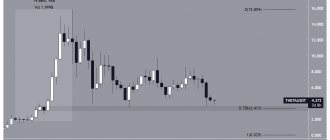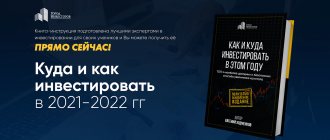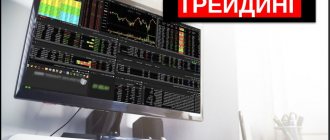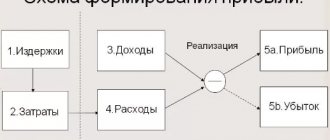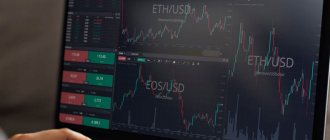Stock trading provides many opportunities for beginners and experienced traders. But to increase the chances of success, you need preparation, knowledge and understanding of what the stock exchange is and how it works. In addition, a novice trader should know how to trade.
There are two main exchanges in Russia: St. Petersburg and Moscow. Both provide access to trading in foreign exchange instruments.
Trading is the execution of purchase and sale transactions on the securities market in a short time in order to make a profit from the difference in purchase and sale prices.
Exchange functions
- Organization of trading in securities of Russian companies (meeting of buyers and sellers through an intermediary represented by the stock exchange);
- Ensuring transaction security.
The exchange charges a commission for its activities. Trading takes place in different markets depending on what is being traded. The main exchange markets served by the Moscow Exchange are the stock, derivatives, foreign exchange and over-the-counter markets. Each market has its own rules and trading requirements.
The stock market is responsible for trading securities, namely stocks and bonds. These securities are considered the most popular for trading on the stock exchange, so read more about the stock market and its rules:
- Order-driven market
The stock market is a place where bids compete: anonymous buyers and sellers bid for the securities they want to buy or sell at specific prices. When orders for purchase and sale match all the requirements of both parties, the transaction is automatically completed at the market price. This means that at the time of the transaction the price satisfied both the seller and the buyer.
- Central counterparty
He is an intermediary between the buyer and seller. As we wrote earlier, in addition to organizing trading and ensuring safe transactions, its main task is to take risks in transactions. That is, he acts as a seller for the buyer and a buyer for the seller. At the Moscow Exchange, the central counterparty is the National Clearing Center, which is owned by Moscow Exchange PJSC.
- Partial provision
The stock market provides access to partial collateral, that is, to leverage: a trader cannot complete a transaction because he does not have enough funds. Then he borrows money from the broker, which is the leverage. In this case, a major transaction will take place, and the trader will receive a large profit, and the debt will be returned to the broker with interest.
- Deferred execution
Shares on the stock market are traded in the T+2 mode - settlements and delivery occur only on the second day after the transaction is concluded. This means that when buying shares, the trader will have them only two days from the date of the transaction. Then the funds will be transferred to the buyer. And at the time of the transaction (T0), the trader may not have the required amount: the broker can use the necessary collateral, which should be available in this case. For example, part of the cash or shares with which the broker can also pay.
Kinds
Figure 1 shows a diagram of the organization of exchange trading using the auction method.
Figure 1. Organization of auction trading in securities
A simple auction is organized when there is a minimum supply and demand for a product:
- A seller's auction (English type) is organized by the seller for the quick sale of any product.
- A buyer's auction (Dutch type) is organized by one (several) participants in order to buy a product at a better price. The number of buyers here is always minimal.
- An absentee auction (silent auction) is conducted in a special way. The seller announces the availability of goods for sale, and buyers, having assessed the possibilities and prospects, each set their own price.
The double auction is popular on developed stock exchange platforms . The bottom line is that applications are received simultaneously from participants on both sides. The organizers of the auction can only satisfy the applications.
- A salvo auction is characterized by a minimum volume of transactions. The spread (the difference between the seller's and buyer's prices) can be huge. The spread is constantly changing during the trading process, therefore, participants are often waiting for a suitable option. Applications come from both sides, accumulate, and then begin to be implemented. The implementation periods are called “volleys”. The “volley” depends on the level of market liquidity. The higher the liquidity, the more frequent the “volleys”. The peculiarity of this auction is the same price for all bidders. At the same time, demand is directly proportional to the “volleys”.
- A continuous auction is a liquid variant of a salvo auction. In this case, transactions on the exchange are satisfied continuously.
There are three types of continuous auction:
- using an order book in which brokers place orders;
- using an electronic display, which displays all relevant information;
- transactions are carried out in the exchange pit, traders communicate live.
Trading methods
- Investing or trading?
You can invest in securities to receive coupon payments and dividends, while earning passive income, since this method of income does not require special investor participation. Or you can engage in trading, which means buying and selling securities in order to make a profit due to price changes. At the same time, these short-term investments require control and participation. In addition, a trader’s activity is accompanied by greater risk, but the profitability will be higher, as well as the likelihood of earning money faster.
- Trading style
There are three styles of how a trader trades. Their difference lies in the holding period of the transaction. This means that, according to a certain style, a trader will spend a certain amount of time trading.
Scalping - a trader makes many transactions with low profitability in the shortest possible time. Their duration can be a couple of minutes, sometimes just a few seconds. The scalper acts quickly, without being distracted by anything. This style is very intense and risky, so it’s not worth starting with.
Day trading (intraday trading) - a trader opens and closes transactions during the trading session, that is, from 9:30-19:00 (for the Moscow Exchange). This style takes several hours of the working day, so it is suitable for those who plan to engage in trading as their main type of work.
Swing traders hold positions for several days, weeks, months. This style does not imply haste, and the trader can take part when it is convenient for him.
- Trading Strategies
A trading strategy implies an algorithm of actions and a set of rules that a trader adheres to while trading. Since there are many strategies, it will be difficult for a beginner to develop a suitable one, moreover, it takes a lot of time. To make it easier to start trading, brokers advise using already created strategies that can guide you by profitability, with established risk levels and initial amounts.
- Mobility
Trades can be made through an app on your phone, allowing you to spend less time trading. In the special QUIKX application, in addition to information about the existing portfolio, there are quotes for Russian securities and securities that are traded on the Moscow and St. Petersburg stock exchanges.
- Stop orders
The most popular stop orders, stop loss and take profit, are designed to buy or sell a financial instrument at the moment when its price matches the one set by the investor. Stop orders allow you not to miss this moment on the stock exchange and at the same time not pay close attention to quotes.
- Personal broker
To have high profitability, you need to devote a lot of time to studying the topic, statistics, and tracking quotes. A personal broker can help with this if the trader does not have time for this. He can advise, help create a portfolio, analyze the market and offer transaction options. But the broker will control the strategy instead of the trader. However, this will help reduce the risk of making mistakes and save time.
- Knowledge and skills
The higher the trading skill, the faster the trader makes decisions. In any field of activity in which a person takes part, one cannot stop there. New techniques and strategies, areas of the financial industry, and so on - all this requires attention, since without updating knowledge, progress is impossible.
Practical aspects of conducting
All auctions are held to match the interests of sellers and buyers. Each participant intends to find the product he is looking for or sell an existing product at a favorable price. The Moscow Exchange has established the practice of regularly checking applications for comparability. The procedure for carrying out this procedure:
- All bids are checked against counter offers. During this process, a queue of unfulfilled applications is formed;
- if the orders for purchase and sale coincide, a purchase and sale operation occurs, that is, the transaction is closed.
Exchange online trading and its features
Before the advent of the Internet, trading on the exchange platform was carried out in person or by telephone. Today, the appearance of trading platforms is different. To learn how to trade on the stock exchange without leaving home, all you need is a computer and Internet access.
Brokers provide each trader with a terminal that displays information on the market: price charts, exchange rates, trade balance, etc. Online traders monitor market trends, use indicators and graphical tools to predict price changes.
When trading on the stock exchange, use the latest analytics from experts and conduct independent fundamental analysis (studying news). When trading online, do not forget that on some trading platforms real quotes are not visible and traders are provided with belated information. Therefore, before trading on the stock exchange, it is important to choose a broker with a good reputation.
Don’t forget that scammers have the most tempting offers: a low entry threshold ($50-100), a small percentage, etc.
How to play on the Internet
It is profitable to play on a stock or currency exchange platform with Internet access. The trader always gets access to up-to-date analytics and any economic news. This information about the exchange brings undoubted benefits to both beginners and professionals.
When performing trading operations, a trader can use modern multifunctional tools that work only in electronic form. The slightest price changes on the stock exchange are instantly reflected on the screen. The trader can play using any indicators and other auxiliary elements.
However, this style of play also has its downsides. If a trader's money falls into the hands of unscrupulous brokers, scammers may provide their clients with deliberately false information.
What types of exchanges are there?
There is a classification of exchanges. They mainly differ in the following characteristics:
- Product type. In addition to stock exchanges, there are commodity, cryptocurrency and currency exchanges. We have already figured out that securities purchase and sale transactions are executed in stock markets. Cryptocurrency is traded on cryptocurrency exchanges, which have emerged quite recently. On commodity exchanges - real goods (agricultural products, oil, gas, precious metals). As for currency exchanges, they trade currencies. There are also so-called derivatives markets - these are markets where trading of industrial financial instruments (futures, options, etc.) takes place.
- Form of participation. There are two types of exchanges - open and closed. On open exchanges, transactions can be carried out by sellers, members of exchanges, as well as buyers. On closed ones, only exchange members have the right to trade.
- Principle of organization. Most existing exchanges are joint stock companies. Exchanges may also be of a mixed type if the shareholder is the government in addition to private companies.
- Role in world trade. Exchanges are divided into national and international. National exchanges are relatively small, and they trade securities of small companies that do not meet the requirements of an international exchange.
What is sold on the stock exchange
The stock exchange trades stocks, shares of mutual funds, bonds and other financial instruments.
We have already found out that securities are issued by issuers to attract capital. The issuer can offer the buyer a stake in its company by issuing shares. By purchasing such shares, an investor becomes a co-owner of a particular company. When issuing bonds, issuers borrow money from investors, promising interest payments for using the borrowed funds.
Securities have their own key parameters, which are determined by the company that issued them, namely: type of security, par value, quantity. Securities undergo a mandatory registration procedure in a special register and are then placed on the stock exchange.
Section 2. General provisions
2.1. The Agreement defines the terms of use of the Information, the rights and obligations of the User arising when gaining access to the Information and Information services through the Site.
The composition of the Information available on the Website is determined by the Company at its sole discretion, taking into account the requirements of laws, regulations of the Bank of Russia and other regulations of the Russian Federation.
The procedure and conditions for obtaining free access to Information through the Site are determined by the Agreement. The procedure and conditions for access to Information services and use of Information are determined by the Agreement, as well as agreements concluded between the Company and Users.
2.2. The agreement is a public offer in accordance with Art. 437 of the Civil Code of the Russian Federation (hereinafter referred to as the Civil Code of the Russian Federation). The Agreement is published on the Site and comes into force from the moment of publication.
The user who has started using the Site is considered to have confirmed his agreement with the terms of the Agreement in the manner prescribed by clause 3 of Art. 434 Civil Code of the Russian Federation.
2.3 In accordance with the legislation of the Russian Federation and concluded agreements, the Company is the copyright holder of the Information, including, but not limited to, Exchange information, Indices and other Derivative information posted on the Site.
We are looking for a reliable broker
Choosing a broker is an important step in preparing for trading:
- Under no circumstances should you enter into an agreement with the first person you come across.
- choose large and well-known companies,
- study the terms of cooperation,
- read reviews on the Internet.
Pay special attention to the following aspects:
- ability to work via the Internet;
- the amount of commission for executing transactions, servicing, using trading terminals and maintaining accounts;
- methods for replenishing your account and withdrawing funds;
- reliability guarantees provided by the broker;
- programs that will be needed to access the exchange, their cost and rules of use.
Many brokers initially offer virtual accounts, also called training accounts, for novice traders.
The specialist will tell you how to play on the stock exchange for free using a special program.
After completing the course, the chances of successfully playing and making a profit increase, but, of course, no one will give a complete guarantee.
Section 3. Procedure and conditions for access to Information.
3.1 In accordance with clause 1, part 3, art. 6 of the Federal Law of July 27, 2006 No. 149-FZ “On Information, Information Technologies and Information Protection” The Company determines the procedure and conditions for the User’s access to the Information posted on the Site.
3.2 The Company provides free of charge access to Exchange information, Indices and other Derivative information to be posted on the Site in accordance with the requirements of laws, regulations of the Bank of Russia, and other regulations of the Russian Federation. Exchange information, Indices and other Derivative information may be used under the conditions established by section 4 of this Agreement.
3.3 All Indices are calculated by the Company using methods published on the Site. The values of additional parameters used in calculating the Indices (coefficients, tariffs) are disclosed on the Site in the public domain.
3.4 Exchange information, as well as any Materials posted on the Site, are not advertising and cannot be regarded as recommendations or offers aimed at encouraging the User to enter into contracts with any exchange commodities (instruments) admitted to organized trading held in commodity sections and the derivatives market section of the Company.
3.5 Information posted on the Site may contain links to third party sites. When following hyperlinks posted on the Site to information resources external to the Site, the User leaves the Site. The Company is not responsible for the unreliability of information posted on information resources external to the Site, as well as for untimely updating and update of the relevant information in their composition.
3.6 The Company does not act as a representative of third parties specified in clause 3.5 of this section of the Agreement. The placement of these links is for informational purposes only and should not be construed as advice, advertising of products, recommendations, or offers sold by any third parties.
3.7 The provision of Information services to the User is carried out on the basis of an agreement for the provision of Information services concluded between the User and the Company. The procedure and conditions for providing access to Information provided in accordance with the agreement for the provision of Information services are determined by the specified agreement.
Choosing a broker - what else to pay attention to
Above we have already given recommendations on choosing a broker. But there are a lot of factors that you need to pay attention to. These also include:
- Promotions and bonuses. It is good that the company undertakes to help traders by providing them with leverage or bonuses in the form of doubling their trading balance. But remember that they won’t give you anything for nothing; you will have to pay a percentage for everything.
- Don't rely on reviews alone. Both positive and negative comments can be written to order. Please pay attention to whether there is a license, which bank services the company, how many years it has existed, and what holding it is part of.
- Be careful with new companies; trading them is risky. Work only with trusted intermediaries.
Many traders are tempted by low spreads. They realize their mistake only after they start trading. In this case, they move to other Internet platforms, and those who are especially vulnerable leave trading forever.


